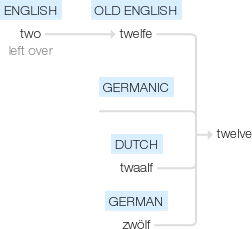Twelve
Old English twelf(e), from the base of two + a second element (probably expressing the sense ‘left over’); of Germanic origin and related to Dutch twaalf and German zwölf . Compare with eleven.
wiktionary
From Middle English twelve, from Old English twelf(“twelve”), from Proto-Germanic *twalif, an old compound of *twa-(“two”) and *-lif(“left over”) (i.e., two left over after having already counted to ten), from Proto-Indo-European *leyp-(“leave, remain”). Cognate with Saterland Frisian tweelf, tweelif, tweelich(“twelve”), West Frisian tolve(“twelve”), Dutch twaalf(“twelve”), German Low German twalf, twalv(“twelve”), German zwölf(“twelve”), Danish, Swedish and Norwegian tolv(“twelve”), Icelandic tólf(“twelve”).
etymonline
twelve (adj., n.)
"1 more than eleven, twice six; the number which is one more than eleven; a symbol representing this number;" Old English twelf "twelve," literally "two left" (over ten), from Proto-Germanic *twa-lif-, a compound of *twa- (from PIE root *dwo- "two") + *lif- (from PIE root *leikw- "to leave"). Compare eleven. Cognate with Old Saxon twelif, Old Norse tolf, Old Frisian twelef, Middle Dutch twalef, Dutch twaalf, Old High German zwelif, German zwölf, Gothic twalif. Outside Germanic, an analogous formation is Lithuanian dvylika, with second element -lika "left over."
